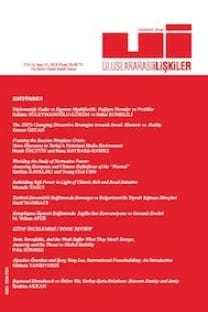Anayasal Bir Tasarım Olarak AB Yarı Başkanlık Hükümet Sistemi
Makale, yürütme organlarının, yürütme-içi ilişkilerin, yürütme ve yasama organları arasındaki ilişkinin ve Maastricht sonrası AB entegrasyon sürecinde Topluluk metodu olarak ulusüstü ile hükümetlerarası doğaya sahip karar alma kombinasyonunun karakteristiklerini incelemektedir. Bu karakteristikler temelinde de AB’nin hükümet sistemini analiz etme amacını taşımaktadır. Aslen AB’nin kendine özgü nitelikleri, devletlerin hükümet sistemleriyle mukayeseli sistemsel analize mani değildir. Bu çerçevede makale, Maastricht sonrası Avrupa entegrasyonunun, özellikle Avrupa Zirve Konseyi’nin artan ayrıcalıklı yetkileri ve Komisyon’un, Avrupa Zirve Konseyi’nin başat statüsüne nazaran ve yasama denetimine tabi rolü veya bir yandan Konsey’in bazı alanlarda arızi yürütme rolü, diğer yandan da Avrupa Parlamentosu’nun alt yasama organı olarak artırılmış yetkilerine vurgu yapmaktadır. Dolayısıyla makale bütün bu unsurlara dikkati çekerek, bilinçli şekilde oluşturulmuş ikili yürütme otoritesinin AB’de yarı başkanlık hükümet sisteminin tedricen inşasını ifade ettiğini iddia etmektedir.
Anahtar Kelimeler:
Dualizm, Dual Yürütme Yapısı, Yarı Başkanlık, Hükümetlerarasıcılık, Ulusalüstücülük
The Semi-Presidential EU Governmental System As A Constitutional Design
The article attempts to depict the governmental system of the EU on the basis of the characteristics of its executive institutions, intra-executive relationships, the relationships between the executive and legislative institutions, and the combination of supranational (the Community method) and intergovernmental nature of decision-making in the post-Maastricht period of European integration. Sui generis characteristics of the EU do not preclude a systemic configuration on the basis of comparative analysis with statal governmental systems. The article asserts that post-Maastricht European integration has led to the gradual establishment of a semipresidential governmental system in the EU. This system accordingly involves particularly on the one hand the deliberative dual-executive authority in the EU, namely the European Council with accumulated prerogatives and the Commission with a subordinated role compared to the dominant position of the European Council, though being subject to legislative scrutiny, or the Council with an occasional executive role in certain fields, and on the other hand the expanded powers of the European Parliament, as the lower house.
Keywords:
Dualism, Dual Executive Structure, Semi-Presidentialism, Intergovernmentalism, Supranationalism,
___
- Christopher J. Bickerton et al., “The New Intergovernmentalism: European Integration in the Post-Maastricht Era”, Journal of Common Market Studies, Vol. 53, No 4, 2015, p. 703-722.
- Uwe Puetter, “The European Council – The New Centre of EU Politics”, SIEPS European Policy Analysis, October 2013, No 16.
- Sergio Fabbrini, “Intergovernmentalism and Its Limits: Assessing the European Union’s Answer to the Euro Crisis”, Comparative Political Studies, Vol. 46 No 9, 2013, p. 1003–1029.
- ISSN: 1304-7310
- Başlangıç: 2004
- Yayıncı: Uluslararası İlişkiler Konseyi Derneği İktisadi İşletmesi
Sayıdaki Diğer Makaleler
20. Yüzyıl Başında Hicaz Vilayeti’nde Bir Rus Diplomatı
Patrick C. Coaty, Small State Behavior in Strategic and Intelligence Studies: David’s Sling
Neslihan Kul, Mutfak, Kimlik, Diplomasi – Türkiye’de Gastro Diplomasi
Kim İşbirliği Yapmak İster? ABD, AB ve Çin Arasındaki Ticaret Savaşının Uzun Dönemli Analizi
Güvenlikleştirmenin 20 Yılı: Gücü, Sınırları ve Yeni Bir İkili Analiz Çerçevesi
Manfred B. Steger and Paul James, Globalization Matters: Engaging the Global in Unsettled Times
Amit Bein, Kemalist Turkey and the Middle East: International Relations in the Interwar Period
Anayasal Bir Tasarım Olarak AB Yarı Başkanlık Hükümet Sistemi
